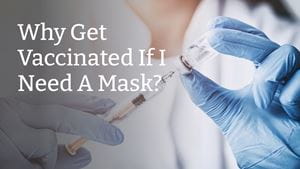
After initially relaxing COVID-19 health and safety guidance about wearing masks indoors, the Centers for Disease Control & Prevention issued new guidelines in July to encourage mask wearing for everyone in areas of “substantial or high transmission.” This new recommendation is for both unvaccinated people and people who are fully vaccinated against the virus.
The announcement led some people to raise a question: What is the point of getting a COVID-19 vaccine if I will need to wear a mask? Emil Lesho, DO, an infectious disease specialist with Rochester Regional Health provides an explanation.
Wearing a mask is part of a larger set of things we can all do to reduce the spread of COVID-19 and limit its harm on everyone.
“Neither masks nor vaccines on their own are a silver bullet,” Dr. Lesho said. “There is not just one thing we can do and COVID-19 will be completely gone. We need to do several different things to keep ourselves and those around us healthy and safe. Wearing a mask is part of that – regardless of whether you’re vaccinated.”
Masking has been proven to significantly reduce the spread of COVID-19. Properly wearing a mask prevents airborne viral particles from getting into your nose and mouth, while also allowing the smaller oxygen and carbon dioxide particles through so you can breathe.
Research shows individuals and groups of people who wear masks indoors have far fewer COVID-19 cases than people who do not wear masks indoors, according to the CDC.
Read more: Breakthrough COVID cases
Other techniques we can use include:
One of the best reasons to get the COVID-19 vaccine is to prevent severe illness and hospitalization if you do contract the virus.
Several studies show a small number of people who are fully vaccinated end up testing positive for the virus. The majority of those people never get any symptoms. The ones who do show symptoms only experience mild versions of the symptoms such as a slight cough, sniffling, or a runny nose.
Especially as the Delta variant of the virus continues to spread in the United States, unvaccinated people have a higher chance of getting COVID-19 and experiencing symptoms without the additional immune protections from the vaccine.
This is why so many hospitals across the country are being filled with people who chose not to get the vaccine, were sickened by the virus, and led to them being hospitalized.
Beyond safeguarding only your own health, you can protect other people too by getting vaccinated.
Since children under 12 are not authorized to get any of the vaccines yet, they are also at risk of getting COVID-19. People who are immunocompromised are also at a higher risk – even if they have been fully vaccinated. This is part of the reason why the FDA has approved them to receive a booster shot within 28 days of their last dose.
Since data first came out about the three COVID-19 vaccines given emergency use authorization by the Food and Drug Administration, each of the vaccines was shown to be effective in reducing the spread of the virus and lessening the severity of the symptoms of people who did test positive for COVID-19.
In clinical trials, approximately 95 percent of patients who got the Pfizer-BioNTech and Moderna vaccines were prevented from being infected by the virus. This means there were still about 5 percent who tested positive for the virus. But of that small number who tested positive, they were kept from severe symptoms, hospitalization, and deaths in nearly all cases.
That still holds true now that nearly 170 million Americans have been fully vaccinated as of late August.
“Getting your COVID shot is the most powerful tool we have to keep you from getting this virus,” Dr. Lesho said. “It doesn’t matter how strong you think your immune system might be or what supplements you might take. The data shows the vaccine is the best way to protect yourself and those around you.”
Even if you have had COVID-19 before, there is still value in getting vaccinated. The vaccine protects us better than natural infection and is far safer.